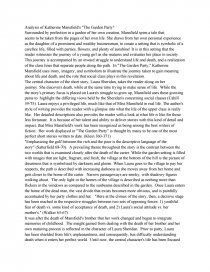Analysis of Katherine Mansfield's - the Garden Party
Essay by Paul • May 31, 2011 • Case Study • 880 Words (4 Pages) • 18,020 Views
Essay Preview: Analysis of Katherine Mansfield's - the Garden Party
Analysis of Katherine Mansfield's "The Garden Party"
Surrounded by perfection in a garden of her own creation, Mansfield spins a tale that
seems to be taken from the pages of her own life. She draws from her own personal experience
as the daughter of a prominent and wealthy businessman, to create a setting that is symbolic of a
carefree life, filled with parties, flowers, and plenty of sunshine! It is in this setting that the
reader witnesses the journey of a young girl as she matures and evaluates her place in society.
This journey is accompanied by an inward struggle to understand life and death, and a realization
of the class lines that separate people along the path. In "The Garden Party," Katherine
Mansfield uses irony, imagery, and symbolism to illustrate the journey taken to gain meaning
about life and death, and the role that social class plays in this revelation.
The central character of the short story, Laura Sheridan, takes the reader along on her
journey. She discovers death, while at the same time trying to make sense of life. While the
the story's primary focus is placed on Laura's struggle to grow up, Mansfield uses these growing
pains to highlight the differing views held by the Sheridan's concerning social classes (Cahill
59-75). Laura enjoys a privileged life, much like that of Miss Mansfield in real life. The author's
style of writing provides the reader with a glimpse into what the life of the upper class is really
like. Her detailed descriptions also provides the reader with a look at what life is like for those
less fortunate. It is because of her talent and ability to deliver stories with this kind of detail and
impact, that Miss Mansfield's work has been recognized as being among the best writers of
fiction. Her work displayed in "The Garden Party" is thought by many to be one of the most
perfect short stories written to date. (Klein 360-371)
"Emphasizing the gulf between the rich and the poor is the descriptive language of the
story" (Satterfield 68-70). A prevailing theme throughout the story is the contrast between the
two worlds that is examined closely after the death of the carter. While the garden setting is filled
with images that are light, fragrant, and fresh, the village at the bottom of the hill is the picture of
dreariness that is symbolized by darkness and gloom. When Laura goes to the village to pay her
respects, the path is described with increasing darkness as she moves away from her home and
gets closer to the home of the carter. Narrow passageways are smoky, with shadowy figures
walking
...
...

